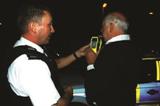Nearly one in three would not try to talk a friend out of drink-driving, while four in 10 know someone who has driven over the drink-drive limit.
That’s according to new RAC research revealed to coincide with the launch of the Government’s Think! drink-drive campaign.
One in 10 (9%), however, say they would warn a friend not to drive otherwise they would call the police, while four in 10 (43%) would try to persuade their friend who had been drinking to take alternative transport home, and even arrange and pay for a taxi.
Only 38% of those questioned claimed to have a zero-alcohol policy when driving to a social function. Just over a quarter (27%) say they will have one small alcoholic drink, such as half a pint, shandy, small wine, small spirit mixed, followed by non-alcoholic drinks and then drive home.
One in 10 (10%) could be risking being over the limit by having one large alcoholic drink, such as a pint of beer or lager, large wine or a large spirit mixed, and then non-alcoholic drinks and drive home. Two per cent say they will have two alcoholic drinks and drive home.
Looking at Christmas Day itself a fifth of those who took part in the research (21%) say they will be driving after celebrating with family or friends and, asked separately, 23% will drink alcohol before driving.
Eight in 10 motorists (81%) of the 1,808 motorists surveyed say they do not think they have driven under the influence of alcohol over the past 12 months. But worryingly, there has been a statistically significant increase in the proportion of drivers who admit in the past 12 months that they have driven shortly after drinking when they think or know they were over the legal limit, rising from 8% to 12%.
Looking at the ‘morning after’ drink-driving issue, 2% say they know they have broken the law in this way, while 8% believe they may have done so.
The figures also show motorists aged between 25 and 44 (24%) are more likely to admit to driving when they think or know they were over the legal limit shortly after drinking than those in other age groups, while those who live in London (32%) or in other cities (23%) also have a greater propensity to drink-drive.
RAC road safety spokesperson Pete Williams said: “The best advice is not to drink at all or to arrange other transport so you can enjoy yourself without the fear and consequences of breaking the law.
“And, for those that have been out drinking it is also essential they ensure they are safe to drive the next day as just going to sleep for a few hours doesn’t necessarily make you legally safe to drive.â€
Think! campaign targets young men
The message from this year Christmas Think! campaign is aimed at young men, urging them not to let their friends drink and drive.
Three new films are being released, based on the award-winning #matesmatter campaign, which last year had the biggest shift in over a decade in young people’s attitudes towards drink driving, according to the Government.
One of the films sees friends in a pub intervene when a man picks up his car keys after he has been drinking, kicking the keys around the venue before they’re taken away by the landlady, who calls for a taxi.
Road safety minister Jesse Norman said: “This festive season, the simple message is that friends need to step in and stop their friends from getting behind the wheel after drinking.â€
Roadside breath tests fall
The RAC research and the the Think! campaign launch comes in the wake of Home Office figures that show the number of roadside screening breath tests fell 15% last year to 325,000, down from a peak of 670,000 in 2009 – a decline of more than 50% in eight years.
For the first time, the number of drivers or motorcyclists breathalysed after an incident also fell below 100,000 in 2017, down 12% in a year and almost half the level of a decade ago.
Lower drink-drive limit
Meanwhile, research from the University of Glasgow suggests that lowering the drink-driving limit in Scotland did not reduce the number of road traffic accidents.
Unlike England and Wales, where the alcohol limit is 80mg in 100ml of blood, Scotland introduced the lower limit in December 2014.
The researchers compared accident rates in Scotland, England and Wales from January 2013 to December 2016 – covering the period before and after the new limit. Their findings were published in The Lancet.
Study lead, Professor Jim Lewsey, believes that the results may be down to the new limit being insufficiently enforced, publicised, or both.
Paul Loughlin, a solicitor in motoring law at the national firm Stephensons, said: “Significant concern over the high rate of drink-driving offences has prompted renewed calls from many to review the drink-drive limit in England and Wales. But the failure of the reduction in the drink-drive limit in Scotland to cut road traffic accidents there suggests that introducing the measure in the rest of Great Britain may not be effective.
“In the vast majority of cases, these are first time offences. Often people feel they are ok to drive and are then surprised when they produce a positive breath sample.
“Tackling the issue of drink-driving isn’t a quick fix, but we do know that education plays a major role. It’s crucial that drivers understand the implications of drink-driving, know the legal limits and where possible avoid alcohol before getting behind the wheel.â€
Drink-drive reminder for business drivers
Licence Bureau is reminding business drivers and fleet operators that compliance should remain top of the agenda at this time of year.
It is advising compliance and fleet managers to pay specific attention to alcohol, drug, in-car smartphone use and general fatigue policies.
Malcolm Maycock, managing director of Licence Bureau, said: “We want all business drivers and fleet managers to be very aware of how to remain compliant during the festive season. This is not a case of being a ‘party pooper’, it’s a case of allowing people to have a good time, safe in the knowledge they are compliant with company policy, and health and safety legislation.
“It’s particularly important that the areas stigmatised by the festive season are addressed and clarity is given to each and every driver within the fleet, and that includes grey fleet drivers too.â€
Reiterating the advice to fleet operators, Licence Bureau has introduced a social media campaign of short films themed ‘Help make our roads a safer place for all’, supported by road safety charity Brake.
The campaign is aimed at raising awareness around the heightened risk of driver distractions and dangers during the festive season.
Maycock continued: “Experience tells us our simple, impactful messages resonate deeply with drivers and organisations. If we can help people stop and think, and ultimately help prevent any road traffic incidents over the festive season then that is a success.â€
The campaign covers areas such as alcohol and drugs, use of smartphones and tiredness which all increase the chances of accidents.
New mobile breathalysers
The Department for Transport (DfT) has also announced the winners of stage one of the competition for new mobile breathalysers, in conjunction with the Parliamentary Advisory Council for Transport Safety (PACTS).
The breathalysers will enable police officers to test drivers instantly at the road side, saving police time as well as getting drink drivers off the roads immediately as they won’t have time to sober up on their way to police station, says DfT.
The winners are Lion Laboratories and Intoximeters. Their designs will now go be submitted for Home Office testing, with a view to being ready for 2020.








